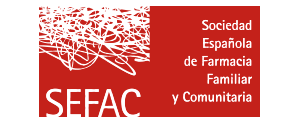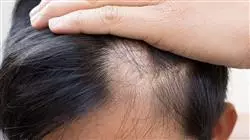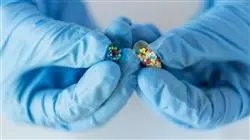University certificate
Scientific endorser

The world's largest faculty of pharmacy”
Introduction to the Program
This Postgraduate diploma in Medication for Dermatologic Pathology in Community Pharmacies is the most complete and up-to-date scientific program on the market”

Whether it is because of easy access to pharmaceutical advice, the user's trust in the pharmacist, or other reasons, community pharmacists are obliged to be trained and constantly updated in Medication for Dermatologic Pathology in Community Pharmacies, and more specifically for dermatologic pathologies.
Dermatology is a medical specialty broad enough to require specialized training, so it is also necessary for community pharmacists to broaden their knowledge of the approach to Medication for Dermatological Pathology in Community Pharmacy in order to improve their performance in the professional pharmaceutical services they provide to their patients.
This Postgraduate diploma in Medication for Dermatologic Pathology in Community Pharmacies is the most complete and up-to-date scientific program on the market”
This Postgraduate diploma in Medication for Dermatologic Pathology in Community Pharmacies is the most complete and up-to-date scientific program on the market. The most important features of the program include:
- Address the most common dermatological pathologies consulted in community pharmacies, review of the treatments available, referrals and action protocols
- Review of other less consulted pathologies but no less important. Although they will always be referred to pharmacists, we must know perfectly well how to support patients in case of doubt regarding treatments or evolution, since they may be more complex pathologies, which can generate more doubts about their treatments
- We will address the dermatological problems that generate common chronic diseases
- Clinical cases will be presented for professional improvement.studies the different types of Nutraceuticals and their Uses
- All this will be complemented by theoretical lessons, questions to the expert, debate forums on controversial topics, and individual reflection assignments
- Content that is accessible from any fixed or portable device with an Internet connection
This Postgraduate diploma may be the best investment you can make in the selection of a refresher program for two reasons: in addition to updating your knowledge of Medication for Dermatologic Pathology in Community Pharmacies, you will obtain an qualification from TECH Global University”
Its teaching staff includes community pharmacy professionals belonging to the field of Medicine for Dermatological Pathology in Community Pharmacy, who contribute their work experience to this training, in addition to recognized specialists belonging to leading scientific societies, such as the Spanish Society of Family and Community Pharmacy.
The multimedia content developed with the latest educational technology will provide the professional with situated and contextual learning, i.e., a simulated environment that will provide an immersive training program to train in real situations.
This program is designed around Problem Based Learning, whereby the Care Services must try to solve the different professional practice situations that arise during the course. For this reason, you will be assisted by an innovative, interactive video system created by renowned and experienced experts in the field of Pharmacology with extensive teaching experience.

Increase your decision-making confidence by updating your knowledge with this Postgraduate diploma in Medication for Dermatologic Pathology in Community Pharmacies"
Why study at TECH?
TECH is the world’s largest online university. With an impressive catalog of more than 14,000 university programs available in 11 languages, it is positioned as a leader in employability, with a 99% job placement rate. In addition, it relies on an enormous faculty of more than 6,000 professors of the highest international renown.

Study at the world's largest online university and guarantee your professional success. The future starts at TECH”
The world’s best online university according to FORBES
The prestigious Forbes magazine, specialized in business and finance, has highlighted TECH as “the world's best online university” This is what they have recently stated in an article in their digital edition in which they echo the success story of this institution, “thanks to the academic offer it provides, the selection of its teaching staff, and an innovative learning method aimed at educating the professionals of the future”
A revolutionary study method, a cutting-edge faculty and a practical focus: the key to TECH's success.
The most complete study plans on the university scene
TECH offers the most complete study plans on the university scene, with syllabuses that cover fundamental concepts and, at the same time, the main scientific advances in their specific scientific areas. In addition, these programs are continuously being updated to guarantee students the academic vanguard and the most in-demand professional skills. In this way, the university's qualifications provide its graduates with a significant advantage to propel their careers to success.
TECH offers the most comprehensive and intensive study plans on the current university scene.
A world-class teaching staff
TECH's teaching staff is made up of more than 6,000 professors with the highest international recognition. Professors, researchers and top executives of multinational companies, including Isaiah Covington, performance coach of the Boston Celtics; Magda Romanska, principal investigator at Harvard MetaLAB; Ignacio Wistumba, chairman of the department of translational molecular pathology at MD Anderson Cancer Center; and D.W. Pine, creative director of TIME magazine, among others.
Internationally renowned experts, specialized in different branches of Health, Technology, Communication and Business, form part of the TECH faculty.
A unique learning method
TECH is the first university to use Relearning in all its programs. It is the best online learning methodology, accredited with international teaching quality certifications, provided by prestigious educational agencies. In addition, this disruptive educational model is complemented with the “Case Method”, thereby setting up a unique online teaching strategy. Innovative teaching resources are also implemented, including detailed videos, infographics and interactive summaries.
TECH combines Relearning and the Case Method in all its university programs to guarantee excellent theoretical and practical learning, studying whenever and wherever you want.
The world's largest online university
TECH is the world’s largest online university. We are the largest educational institution, with the best and widest online educational catalog, one hundred percent online and covering the vast majority of areas of knowledge. We offer a large selection of our own degrees and accredited online undergraduate and postgraduate degrees. In total, more than 14,000 university degrees, in eleven different languages, make us the largest educational largest in the world.
TECH has the world's most extensive catalog of academic and official programs, available in more than 11 languages.
Google Premier Partner
The American technology giant has awarded TECH the Google Google Premier Partner badge. This award, which is only available to 3% of the world's companies, highlights the efficient, flexible and tailored experience that this university provides to students. The recognition as a Google Premier Partner not only accredits the maximum rigor, performance and investment in TECH's digital infrastructures, but also places this university as one of the world's leading technology companies.
Google has positioned TECH in the top 3% of the world's most important technology companies by awarding it its Google Premier Partner badge.
The official online university of the NBA
TECH is the official online university of the NBA. Thanks to our agreement with the biggest league in basketball, we offer our students exclusive university programs, as well as a wide variety of educational resources focused on the business of the league and other areas of the sports industry. Each program is made up of a uniquely designed syllabus and features exceptional guest hosts: professionals with a distinguished sports background who will offer their expertise on the most relevant topics.
TECH has been selected by the NBA, the world's top basketball league, as its official online university.
The top-rated university by its students
Students have positioned TECH as the world's top-rated university on the main review websites, with a highest rating of 4.9 out of 5, obtained from more than 1,000 reviews. These results consolidate TECH as the benchmark university institution at an international level, reflecting the excellence and positive impact of its educational model.” reflecting the excellence and positive impact of its educational model.”
TECH is the world’s top-rated university by its students.
Leaders in employability
TECH has managed to become the leading university in employability. 99% of its students obtain jobs in the academic field they have studied, within one year of completing any of the university's programs. A similar number achieve immediate career enhancement. All this thanks to a study methodology that bases its effectiveness on the acquisition of practical skills, which are absolutely necessary for professional development.
99% of TECH graduates find a job within a year of completing their studies.
Postgraduate Diploma in Medication for Dermatologic Pathology in Community Pharmacies
Dermatological pathology affects a large number of people and, in many cases, requires specific treatments to alleviate symptoms and improve patients' quality of life. In community pharmacy, pharmacists play a key role in providing information and guidance on the medications used in the treatment of these conditions. If you want to specialize in this field, TECH Global University has the ideal program for you. The Postgraduate Diploma in Medication for Dermatologic Pathology in Community Pharmacies is an online postgraduate course of the highest standard, which presents itself as a unique qualification opportunity to take your skills to the next level. Here, you will immerse yourself in the fascinating field of skin diseases and learn how to identify, treat and advise on common dermatological pathologies.
Get your degree from the world's largest online pharmacy school
Our academic program, supported by experts in dermatology and pharmacy, will provide you with comprehensive, up-to-date training on medications used in the treatment of dermatologic pathologies. During the course, you will explore a wide range of topics, from the basics of skin anatomy and physiology, to the pharmacological management of specific dermatological conditions such as acne, psoriasis, skin infections and more. You will learn how to evaluate patients' symptoms, perform appropriate pharmacotherapeutic monitoring, and offer practical advice for the care and maintenance of healthy skin. Upon completion of the course, you will receive a recognized university certificate that will validate your new knowledge and give you a competitive edge in the workplace. You will be able to apply what you have learned in your professional practice, offering your patients a specialized and quality service.







